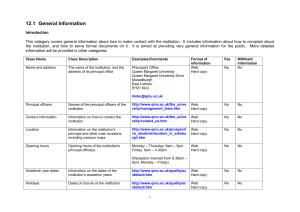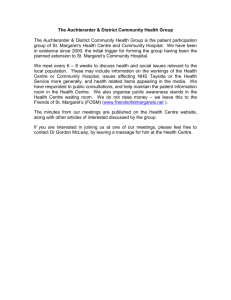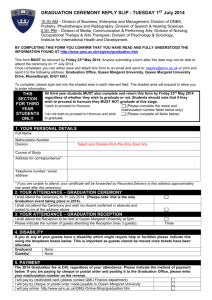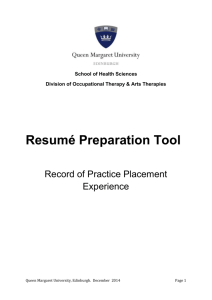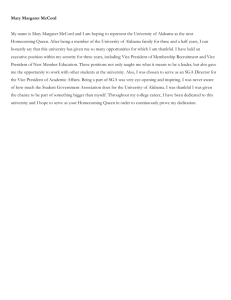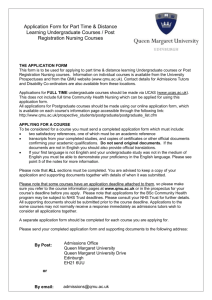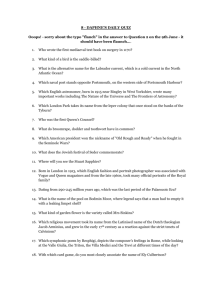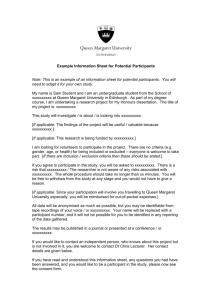STUDENT REGULATIONS, POLICIES AND CODES OF CONDUCT
advertisement
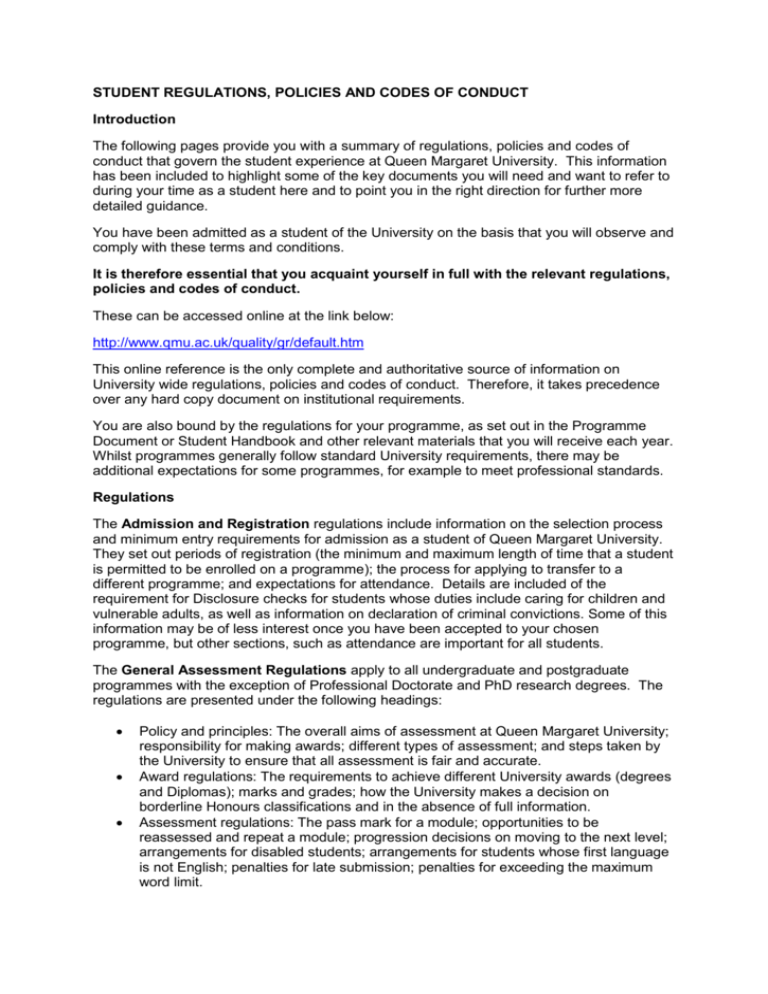
STUDENT REGULATIONS, POLICIES AND CODES OF CONDUCT Introduction The following pages provide you with a summary of regulations, policies and codes of conduct that govern the student experience at Queen Margaret University. This information has been included to highlight some of the key documents you will need and want to refer to during your time as a student here and to point you in the right direction for further more detailed guidance. You have been admitted as a student of the University on the basis that you will observe and comply with these terms and conditions. It is therefore essential that you acquaint yourself in full with the relevant regulations, policies and codes of conduct. These can be accessed online at the link below: http://www.qmu.ac.uk/quality/gr/default.htm This online reference is the only complete and authoritative source of information on University wide regulations, policies and codes of conduct. Therefore, it takes precedence over any hard copy document on institutional requirements. You are also bound by the regulations for your programme, as set out in the Programme Document or Student Handbook and other relevant materials that you will receive each year. Whilst programmes generally follow standard University requirements, there may be additional expectations for some programmes, for example to meet professional standards. Regulations The Admission and Registration regulations include information on the selection process and minimum entry requirements for admission as a student of Queen Margaret University. They set out periods of registration (the minimum and maximum length of time that a student is permitted to be enrolled on a programme); the process for applying to transfer to a different programme; and expectations for attendance. Details are included of the requirement for Disclosure checks for students whose duties include caring for children and vulnerable adults, as well as information on declaration of criminal convictions. Some of this information may be of less interest once you have been accepted to your chosen programme, but other sections, such as attendance are important for all students. The General Assessment Regulations apply to all undergraduate and postgraduate programmes with the exception of Professional Doctorate and PhD research degrees. The regulations are presented under the following headings: Policy and principles: The overall aims of assessment at Queen Margaret University; responsibility for making awards; different types of assessment; and steps taken by the University to ensure that all assessment is fair and accurate. Award regulations: The requirements to achieve different University awards (degrees and Diplomas); marks and grades; how the University makes a decision on borderline Honours classifications and in the absence of full information. Assessment regulations: The pass mark for a module; opportunities to be reassessed and repeat a module; progression decisions on moving to the next level; arrangements for disabled students; arrangements for students whose first language is not English; penalties for late submission; penalties for exceeding the maximum word limit. Responsibilities: Student and staff responsibilities; project supervision; timescale for feedback on student work; plagiarism. Particular regulations apply to postgraduate and research students. For taught postgraduates, the Taught Postgraduate Framework defines the main aims and features of study at this level as well as arrangements for the management of postgraduate degrees, including project guidelines. PhD students should refer to the Research Degrees Regulations and Code of Practice. There is a separate Professional Doctorate Framework. Exam regulations are published in a separate document. This includes information on staff and student responsibilities and instructions on the conduct of exams, for example: items permitted in the exam hall; late admission of candidates and arrangements for examinations out with the University. All students undertaking research need to be aware of and comply with the Research Ethics Regulations, Procedures and Guidance. This document includes information on overarching ethical principles as well as practical guidance on submitting an application for ethical approval. Note that no research may be undertaken in partial fulfilment of a QMU award without securing ethical approval first. The Academic Appeals Procedure sets out the process for requesting a review of a decision taken by a Board of Examiners about student performance or progress. There are specific guidelines on the timescale for submitting an appeal as well as the grounds on which a student is entitled to appeal. Any appeals that do not meet these criteria will be rejected. The Student Complaints Procedure explains the process for students to express dissatisfaction that a University service has failed to meet the standard promised or that it would be reasonable to expect. The Disciplinary Procedure explains the procedure for dealing with student misconduct. Types of behaviour that would be classed as misconduct are defined, and the penalties are set out together with the process for appealing the decision. Policies The Fitness to Practise policy applies to all Nursing students and students following any other professional health care programme. ‘Fit to practise’ means that a person has the necessary skills, knowledge, good character and health to undertake their professional role safely and effectively. Where it is alleged that a student is not fit to practise, the case may be referred to a ‘Fitness to Practise Panel’ which will review the evidence and make a recommendation on the student’s continuation at Queen Margaret University. Occasionally, it may be impossible to attend an examination or submit coursework on time. The Extenuating Circumstances Guidance explains the process for requesting an extension or alternative arrangement to retrieve the missed examination because of circumstances out with your control. The types of circumstances that might be considered are defined as well as the type of evidence necessary to approve the claim. Note that consideration will only be given to genuinely exceptional circumstances, as students are expected to manage their usual study, work and other known commitments. Each student at the University has a Personal Academic Tutor (PAT). To help students and staff develop a shared understanding of the PAT role and make the best use of PAT meetings, a summary and extended guide are available setting out responsibilities, topics that might be covered with the PAT and topics that need to be referred elsewhere within QMU. The University seeks to offer each student Personal Development Planning (PDP) opportunities. The PDP Policy explains the ways in which students are enabled to reflect on their performance and to plan for their personal, academic and professional development. Code of Conduct The overarching Student Code of Conduct was developed in partnership between the University and the Students’ Union. The main purpose of the Code is to help every student enjoy and benefit from their education and life with Queen Margaret University. The Code provides clear guidelines for acceptable behaviour. This general set of Principles is supported by more detailed Codes of Conduct specifically relating to Halls of Residence, Library, Learning Environments and IT facilities. It should be read in conjunction with the University’s current Student Regulations, as listed above, and the Equal Opportunities Policy, which is also available from the link above. A final word Regulations, policies and codes of conduct may seem dull and will almost certainly not be your first priority! However, they are necessary to ensure a fair and consistent experience for all students. They set out your duties and obligations as a responsible member of the academic community, as well as the level of service you can expect to receive from the University. They are reviewed regularly with student input to ensure they remain fit for purpose and user friendly. We welcome any feedback on your experience of using our regulations, policies and codes of conduct, so please let us know if you have any comments. These can be submitted to Dawn Martin, Assistant Registrar, Quality Enhancement: dmartin1@qmu.ac.uk
